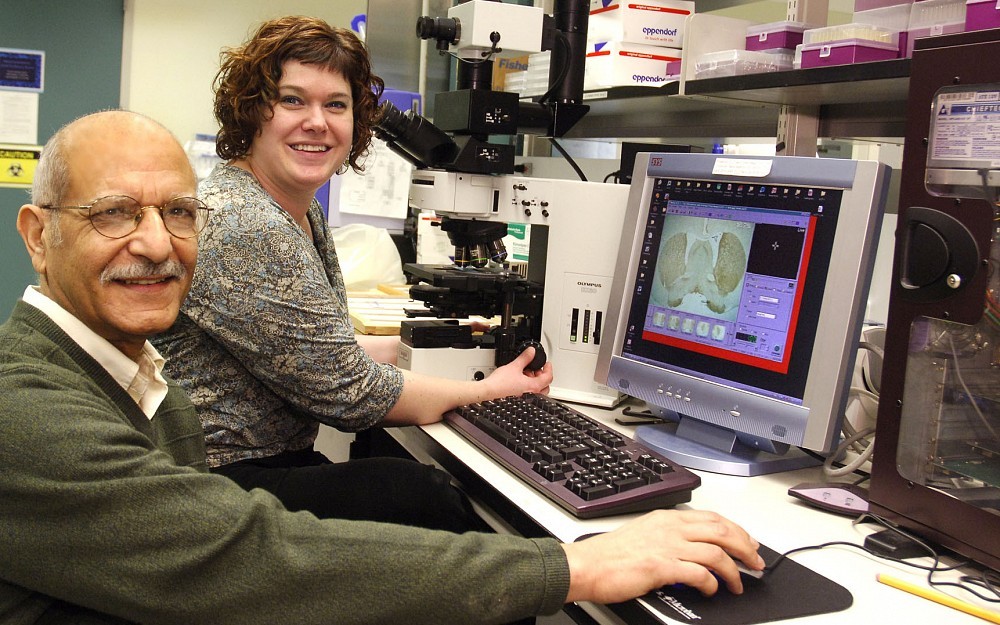
Scientists Studying Brain Stimulation Potential to Protect Dopamine Cells in Parkinson's Disease
CINCINNATIActing on an observation by physicians that a surgical treatment for Parkinsons disease appears to slow disease progression, scientists at the University of Cincinnati (UC) have launched a laboratory study that could one day alter the current timetable for surgical intervention.
Physicians have long been able to neutralize some of the most debilitating symptoms of Parkinsons disease, including tremor and slowness, by stimulating an area deep within the brain. But whether this procedure, known as deep brain stimulation (DBS), also protects the brain from further deterioration remains unclear.
Researchers at the Neuroscience Institute at the University of Cincinnait and University Hospital will probe that question in a study supported by a $120,000 grant from the Davis Phinney Foundations Sunflower Revolution, an annual fundraiser and bike ride held in Cincinnati.
The Davis Phinney Foundation is pleased to support a study of this importance and originality, said Rick Tallman, the foundations executive director. Clarification of deep brain stimulations role in neuroprotection could have important ramifications for thousands of people with Parkinsons disease.
Parkinsons disease is a degenerative neurological disorder involving the death of dopamine-producing neurons. The Neuroscience Institute researchers will strive to determine whether stimulation of the subthalamic nucleus, an area of the brain associated with movement, confers protection of these dopamine neurons in rats compromised by Parkinsons disease.
The study is clinically relevant, said Caryl Sortwell, PhD, associate professor of neurology at UC and the studys principal investigator. There are anecdotal reports from physicians who see patients a number of years after deep brain stimulation. Doctors have observed that when the stimulators are turned off, the patients decline is less than what they expected to see.
The study brings together investigators from four academic disciplines: Sortwell and Timothy Collier, PhD, from the department of neurology; Michael Behbehani, PhD, from the department of physiology; Jack Lipton, PhD, from the department of psychiatry; and George Mandybur, MD, of the department of neurosurgery.
The scientists will implant high-frequency stimulating electrodes in the rats and will take precise measurements of surviving, functioning dopamine neurons at varying intervals. Rats implanted with active stimulators will be compared to a control group implanted with inactive stimulators.
Behbehani, professor of molecular and cellular physiology and anesthesia, established the method for implanting the electrodes in the rats tiny subthalamic nucleus.
You cant use an atlas of the rat brain to locate the subthalamic nucleus, Sortwell said. Youd hit and miss. You need to use electrophysiological methods consisting of a recording device to listen to the electrical signature of different cellular populations of the brain. In this way you can find the significant, bursting signature pattern of the subthalamic nucleus.
The study cannot be performed in a human population, Sortwell said, because denying DBS to a patient with disabling symptoms would be unethical.
Mandybur, a neurosurgeon with the Mayfield Clinic and the Neuroscience Institute, concurs that DBS seems to slow the progression of Parkinsons disease.
From a clinical point of view, I have seen dozens of patients who have undergone deep brain stimulation, and my impression is that somehow the procedure slows down the progression in many patients, he said. When we see something like this in the clinic, we want to prove our theory.
Though the study involves rats, it may hold profound implications for people stricken with Parkinsons disease.
If we do prove that DBS offers neuroprotection, Mandybur said, then maybe we should be doing the procedure earlier in the patients life.
Currently, patients with Parkinsons disease undergo DBS an average of 14 years after diagnosis.
Funds from the Sunflower Revolution also will be used to double the laboratorys capacity to study brain-stimulated rats from four rats a month to eight. The laboratorys initial study platform was funded by UCs Millennium Fund and subsequently by the Neuroscience Institute.
The Denver-based Davis Phinney Foundation, named for the former Tour de France cyclist Davis Phinney, is dedicated to supporting research aimed at understanding, preventing, and treating Parkinsons disease, which affects an estimated 1.5 million Americans. The foundation also seeks to find ways to improve the lives of individuals challenged by the disease. In 2006 the foundation named the Neuroscience Institute and Stanford University its first Davis Phinney Research Centers.
The Neuroscience Institute, a regional center of excellence at the University of Cincinnati and University Hospital, is dedicated to patient care, research, education, and the development of new treatments for stroke, brain and spinal tumors, epilepsy, multiple sclerosis, trauma, Parkinsons disease, and Alzheimers disease.
Sunflower Revolution III, held in October 2006, raised $300,000. The Harold C. Schott Foundation was the events presenting sponsor. Sunflower Revolution IV is scheduled for Sept. 7-9, 2007.
Tags
Related Stories
Managing outpatient challenges for hypertensive intracerebral...
July 23, 2025
The University of Cincinnati Gardner Neuroscience Institute's Yasmin Aziz, MD, was featured in a MedCentral article discussing the challenges of managing hypertensive intracerebral hemorrhage in outpatient settings.
Donors drive record-breaking support for UC and UC Health
July 22, 2025
Generous donors have propelled the University of Cincinnati and UC Health to a historic fundraising year, contributing an unprecedented $228,479,079 in support.
UC students help to organize weekend medical clinic held at...
July 21, 2025
Thanks to a collaborative effort among Remote Area Medical Volunteers Corps, the University of Cincinnati's student chapter of RAM and Anthem Blue Cross and Blue Shield, Tristate residents had access to free medical care this weekend — no questions asked.
